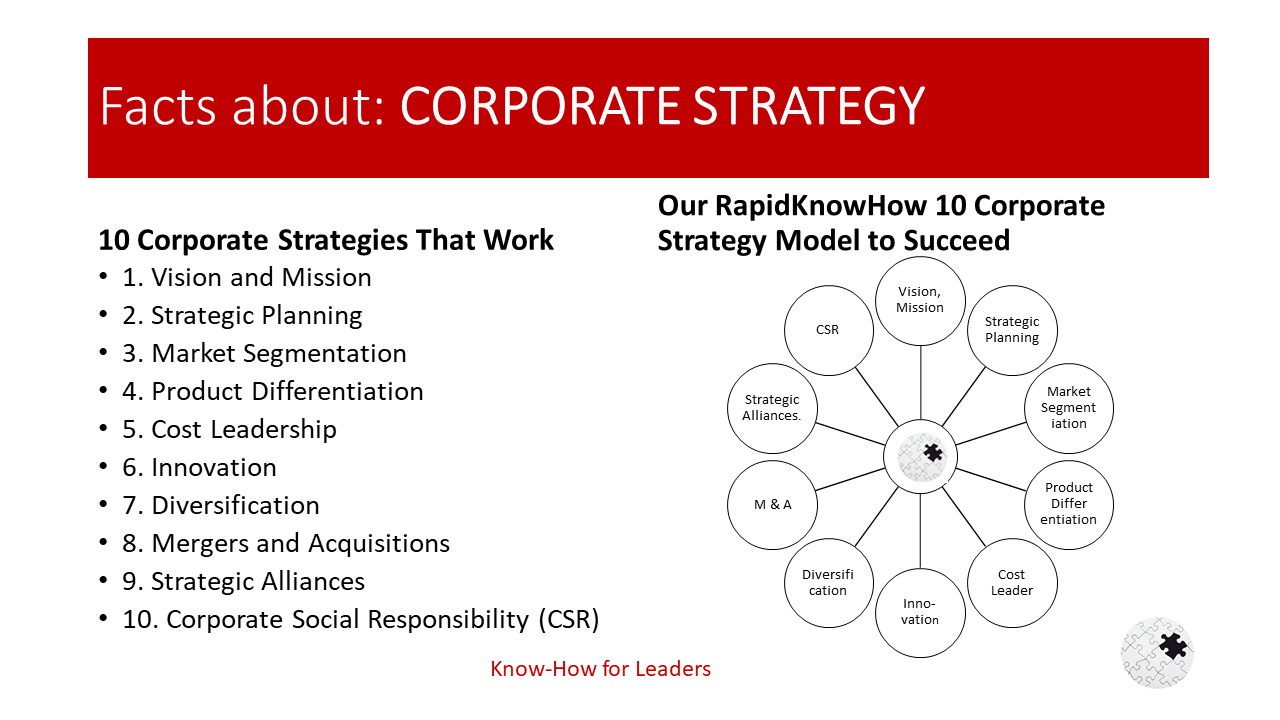Problem
In the ever-evolving corporate world, businesses are constantly faced with the challenge of staying relevant and competitive. The problem lies in the fact that many companies struggle to develop and implement effective corporate strategies that can drive growth, increase profitability, and ensure long-term success. This is often due to a lack of understanding of what constitutes a successful strategy, failure to adapt to changing market conditions, or inability to effectively execute the strategies.
Impact
The impact of not having effective corporate strategies can be detrimental to a business. It can lead to poor financial performance, loss of market share, decreased employee morale, and ultimately, business failure. On the other hand, companies that have well-defined and effective corporate strategies are more likely to achieve their business objectives, improve their competitive position, and ensure sustainable growth.
10 Corporate Strategies That Work
1. Clear Vision and Mission: A clear vision and mission provide direction for the company and serve as a guide for decision-making.
2. Strategic Planning: This involves setting long-term goals and determining the best approach to achieve them.
3. Market Segmentation: This strategy involves dividing the market into distinct groups of customers with different needs or characteristics.
4. Product Differentiation: This strategy involves creating unique products or services that offer superior value compared to competitors.
5. Cost Leadership: This strategy involves becoming the lowest cost producer in the industry.
6. Innovation: This strategy involves creating new products or services or improving existing ones to gain a competitive advantage.
7. Diversification: This strategy involves entering new markets or industries to spread risk and increase opportunities for growth.
8. Mergers and Acquisitions: This strategy involves buying or merging with other companies to increase market share or gain access to new markets or technologies.
9. Strategic Alliances: This strategy involves partnering with other companies for mutual benefit.
10. Corporate Social Responsibility (CSR): This strategy involves taking actions that benefit society as well as the company.
Case Studies: Industry, Government
Several companies have successfully implemented these strategies. For instance, Apple Inc. has used product differentiation and innovation to become a leading player in the technology industry. On the other hand, Walmart has used cost leadership to become the world’s largest retailer.
In the government sector, strategic planning and clear vision and mission are commonly used strategies. For example, the UK government has a clear vision to build a stronger, fairer Britain and uses strategic planning to achieve this vision.
Get Started Step-by-Step
1. Define your vision and mission.
2. Conduct a SWOT analysis to identify your strengths, weaknesses, opportunities, and threats.
3. Choose the corporate strategies that best fit your company’s situation.
4. Develop a detailed plan for implementing each strategy.
5. Communicate the strategies and plan to all employees.
6. Monitor progress regularly and make necessary adjustments.
Conclusion
In conclusion, having effective corporate strategies is crucial for any business to succeed in today’s competitive corporate world. By implementing proven strategies such as clear vision and mission, strategic planning, market segmentation, product differentiation, cost leadership, innovation, diversification, mergers and acquisitions, strategic alliances, and CSR, companies can drive growth, increase profitability, and ensure long-term success. However, it’s important to remember that these strategies should be tailored to fit each company’s unique situation and capabilities.

